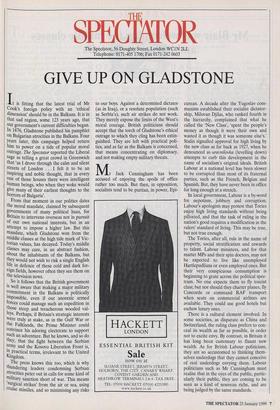SPECTATOR
The The Spectator, 56 Doughty Street, London WC1N 2LL Telephone: 0171-405 1706; Fax 0171-242 0603
GIVE UP ON GLADSTONE
It is fitting that the latest trial of Mr Cook's foreign policy with an 'ethical dimension' should be in the Balkans. It is in that sad region, some 123 years ago, that our government's current difficulties began. In 1876, Gladstone published his pamphlet on Bulgarian atrocities in the Balkans. Four years later, this campaign helped return him to power on a tide of popular moral outrage. The Spectator reported the Liberal sage as telling a great crowd in Greenwich that 'as I drove through the calm and silent streets of London . . . I felt it to be an inspiring and noble thought, that in every one of those houses there were intelligent human beings, who when they woke would give many of their earliest thoughts to the horrors of Bulgaria'. From that moment in our politics dates the moral mandate, claimed by subsequent governments of many political hues, for Britain to intervene overseas not in pursuit of our own national interests, but in an attempt to impose a higher law. But this mandate, which Gladstone won from the middle classes at the high tide mark of Vic- torian values, has decayed. Today's middle classes may care, in an abstract fashion, about the inhabitants of the Balkans, but they would not wish to risk a single English life in defence of these cold and dark for- eign fields, however often they see them on the television news.
So it follows that the British government is well aware that making a major military Commitment in the Balkans is politically impossible, even if our anorexic armed forces could manage such an expedition in those steep and treacherous wooded val- leys. Perhaps, if Britain's strategic interests were truly at stake, as in the Gulf War or the Falklands, the Prime Minister could convince his adoring electorate to support such an adventure. But he knows, and so do they, that the fight between the Serbian army and the Kosovo Liberation Front is, in. practical terms, irrelevant to the United Kingdom.
The press knows this too, which is why thundering leaders condemning Serbian atrocities peter out in calls for some kind of !Unary sanction short of war. This means surgical strikes' from the air or sea, using cruise missiles, and so minimising any risks to our boys. Against a determined dictator (as in Iraq), or a resolute population (such as Serbia's), such air strikes do not work. They merely expose the limits of the West's moral courage. British politicians should accept that the torch of Gladstone's ethical outrage to which they cling has been extin- guished. They are left with practical poli- tics, and as far as the Balkans is concerned, that means concentrating on diplomacy, and not making empty military threats.
Mr Jack Cunningham has been accused of enjoying the spoils of office rather too much. But then, in opposition, socialists tend to be puritan, in power, Epi- curean. A decade after the Yugoslav com- munists established their socialist dictator- ship, Milovan Djilas, who ranked fourth in the hierarchy, complained that what he called the 'New Class', 'spent the people's money as though it were their own and wasted it as though it was someone else's.' Stalin signalled approval for high living by the new class as far back as 1927, when he denounced as uravnilovka (levelling down) attempts to curb this development in the name of socialism's original ideals. British Labour at a national level has been slower to be corrupted than most of its fraternal parties, such as the French, Belgian and Spanish. But, they have never been in office for long enough at a stretch.
In local government, Labour is a by-word for nepotism, jobbery and corruption; Labour's apologists may protest that Tories enjoy high living standards without being pilloried, and that the task of ruling in the nation's good requires a modification in the rulers' standard of living. This may be true, but not true enough.
The Tories, after all, rule in the name of property, social stratification and rewards to talent. Labour ministers, and for that matter MPs and their spin doctors, may not be expected to live like unemployed Hartlepudlians or even employed ones. But their very conspicuous consumption is beginning to grate across the political spec- trum. No one expects them to fly tourist class; but nor should they charter planes, fly Concorde or command RAF transport when seats on commercial airlines are available. They could use good hotels but eschew luxury ones.
There is a cultural element involved. In some societies, as disparate as China and Switzerland, the ruling class prefers to con- ceal its wealth as far as possible, in order not to excite envy. By contrast, in Britain it has long been customary to flaunt new wealth. As for British Labour politicians, they are so accustomed to thinking them- selves underdogs that they cannot conceive of real underdogs envying them. Labour politicians such as Mr Cunningham must realise that in the eyes of the public, partic- ularly their public, they are coming to be seen as a kind of nouveau riche, and are being judged by the same standards.


























































 Previous page
Previous page